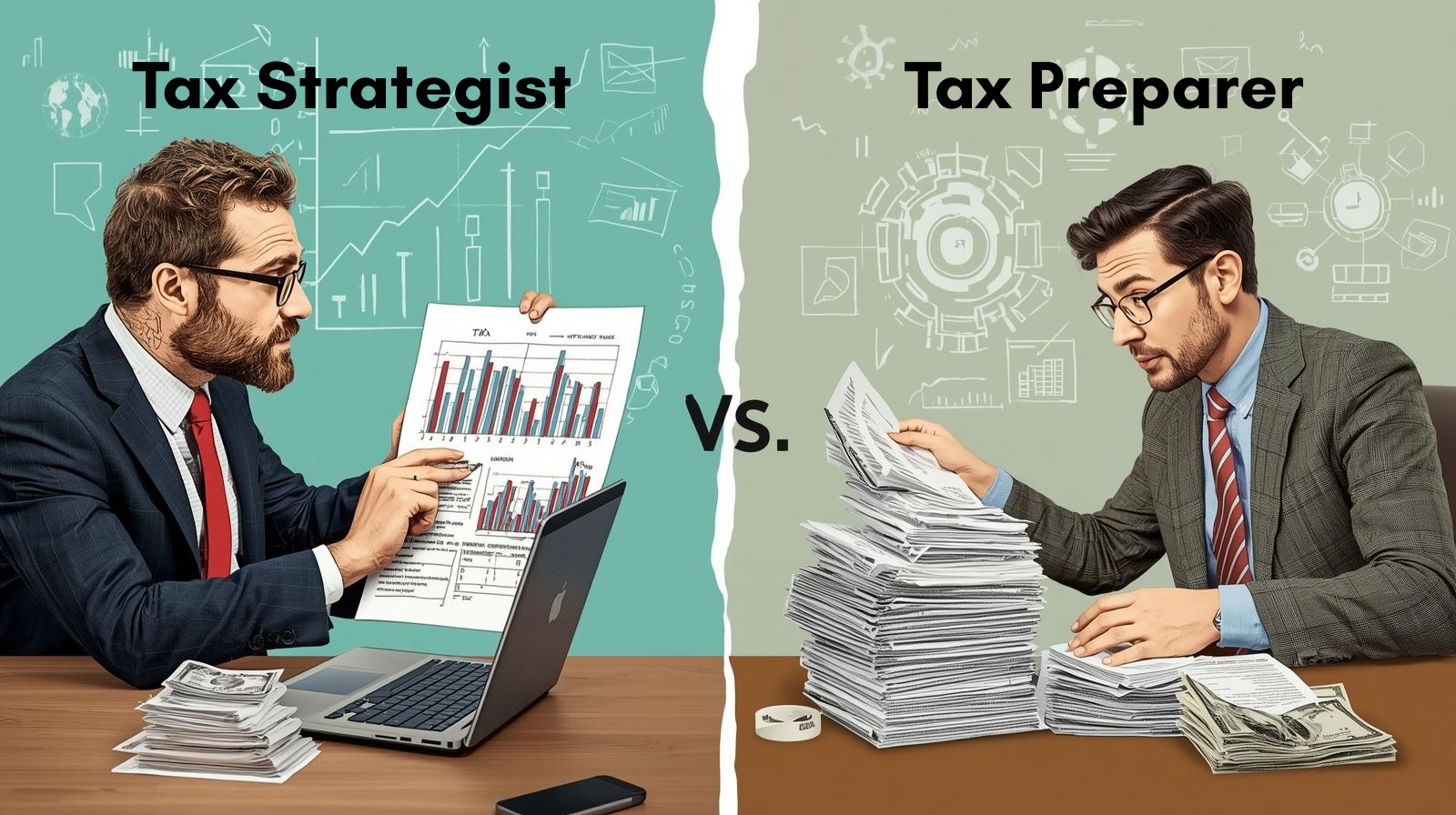Most business owners work with a tax professional every year—but here’s the problem: they often work with the wrong type of tax professional without even realizing it.
If you’ve ever felt like you’re overpaying in taxes, missing opportunities, or only talking to your CPA during tax season, you’re not alone. The truth is that tax compliance and tax strategy are two completely different services—and understanding the difference could transform your financial future.
In this article, we’ll break down the distinctions, show real-world case studies, and help you identify what level of tax planning you’re truly receiving.
Tax Compliance vs. Tax Strategy: What Most Business Owners Miss
What Tax Preparers Do (Compliance)
Tax preparers focus on:
-
Accurate filing
-
Following IRS rules
-
Making sure compliance is handled correctly
-
Submitting taxes on time
-
Keeping you out of trouble
These professionals are essential—your taxes need to be filed correctly every year.
But here’s where many business owners make the mistake…
What Tax Strategists Do (Planning)
Tax strategists focus on:
-
Year-round tax minimization
-
Long-term planning
-
Structure optimization
-
Identifying advanced tax opportunities
-
Ensuring you only pay what you’re legally required to—not a dollar more
The tax code is designed to benefit business owners and investors. In fact, over 99% of the tax code exists to help you reduce your tax burden through credits, deductions, and strategic planning.
If your tax pro is only focused on filing—you’re missing thousands of dollars in legal incentives every year.
A Real Case Study: The $87,000 Tax Bill That Could’ve Been Avoided
A profitable business owner came to us after five years with the same CPA. Her returns were accurate and always filed on time—but this year she owed $87,000.
When she asked her CPA if anything could be done, he replied:
“You should be grateful you’re making enough to owe this much.”
While technically not wrong, he missed the bigger picture—
She didn’t need better filing.
She needed strategic planning.
Within months, we restructured her plan, identified overlooked deductions, optimized timing, and created a multi-year strategy. Her tax burden dropped dramatically—because we focused on strategy, not just compliance.
3 Signs You Need a Tax Strategist—Not Just a Tax Preparer
1. You Ask Strategy Questions but Get Compliance Answers
If you ask:
-
“How can I reduce my taxes?”
-
“What strategies apply to my industry?”
-
“What can I do throughout the year to save more?”
…and all you get is “We’ll see during tax season,” you’re not getting true strategy.
2. You Only Hear From Your CPA During Tax Season
Real tax strategy is proactive, not reactive.
If you don’t have quarterly or mid-year planning sessions, opportunities are being missed.
3. You Know You Should Be Saving More—But Don’t Know How
This feeling is extremely common, and it’s usually a sign your current professional is operating at only the foundational level of tax planning.
The Three Levels of Tax Strategy: Which One Are You Getting?
Not all planning is equal. Here’s how to understand the level of strategy you’re currently receiving:
Level 1: Foundation Strategies (Basic Level)
These strategies include:
-
S-Corp election (reducing self-employment tax)
-
Basic retirement contributions (401k, SEP IRA)
-
Home office or Augusta Rule (14-day rental)
-
Standard vehicle deduction and mileage tracking
-
General business deductions
These are simple and useful—but they’re entry-level. If your tax strategist stops here, you’re losing thousands.
Level 2: Intermediate Strategies
This is where real savings begin:
-
Cost segregation studies for real estate
-
Advanced retirement planning like cash balance plans
-
Multi-entity restructuring
-
Depreciation acceleration
-
Strategic timing of income and expenses
Example:
A client saving $15,000 annually with basic strategies came to us. After a comprehensive analysis, we added intermediate strategies and saved an additional $80,000 in year one alone.
Level 3: Advanced Strategies (Rarely Offered)
Only a small percentage of professionals operate at this level. These strategies include:
-
Captive insurance companies
-
Deferred sales trusts
-
Advanced real estate tax structures
-
International tax optimization
-
Complex multi-entity planning
-
High-net-worth wealth preservation strategies
If your business is scaling or highly profitable, these strategies can completely reshape your financial landscape.
How to Know What Level of Tax Planning You’re Truly Receiving
Ask your tax professional these diagnostic questions:
-
“What is your proactive planning process?”
-
“What advanced strategies have you implemented for someone like me?”
-
“How often do you perform cost segregation studies?”
-
“Do you work with cash balance plans or other advanced retirement options?”
-
“What percentage of your clients do you contact proactively throughout the year?”
If the answers are vague, defensive, or overly cautious, it’s a sign you’re only receiving compliance—not strategy.
Why This Matters More Than Ever
As your business grows, so does your tax burden.
But with proper planning, business owners can legally save tens of thousands—sometimes hundreds of thousands—every single year.
The tax code rewards those who understand it.
And if your current professional only focuses on compliance, you’re not accessing the benefits intentionally built for business owners and investors.
It’s Not What You Make—It’s What You Keep
Understanding the difference between tax compliance and tax strategy can fundamentally change your financial future.
If you’re profitable, paying substantial taxes, and only hearing from your tax professional during filing season, it’s time to explore a more strategic approach.
Want to go deeper?
Explore advanced examples and in-depth strategies at yourbiggestexpense.com.
FAQs
1. What is the difference between a tax preparer and a tax strategist?
A tax preparer focuses on filing your taxes accurately and following compliance rules. A tax strategist proactively plans your financial decisions to reduce your tax burden legally throughout the year.
2. When should a business owner hire a tax strategist?
If you earn consistent profits, pay significant taxes, or feel like there should be more legal opportunities to reduce your burden, it’s time to work with a strategist.
3. Are tax strategies legal?
Yes, every strategy mentioned in this article follows IRS code. Over 99% of the tax code incentivizes business owners and investors to reduce taxes through legal methods.
4. Why doesn’t my CPA already offer these strategies?
Most CPAs are trained in compliance, not in year-round strategic tax planning. Strategy requires advanced training, proactive engagement, and often a specialized team.
5. How much can tax strategy save me?
Savings vary, but many business owners reduce their tax burden by $20,000 to $150,000+ annually with proper planning.
6. How do I know if my current tax pro is proactive?
If they only contact you during filing season, don’t offer quarterly planning, or don’t discuss advanced strategies regularly, they are likely reactive—not strategic.





